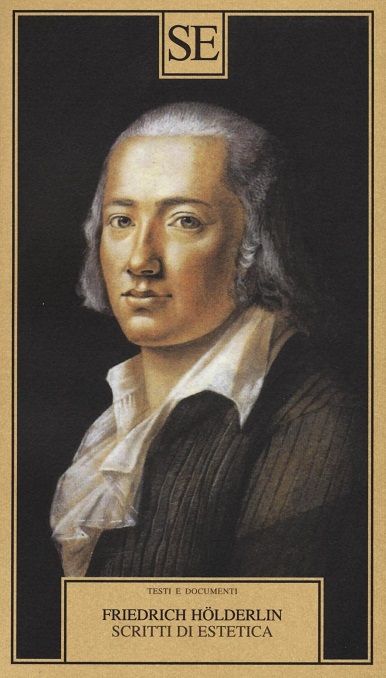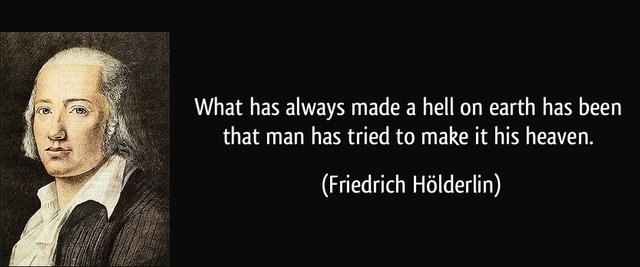We could not overlook the original poet, the precursor of Romanticism in Germany, Hölderlin, who could hardly be classified as a classic or romantic. He defines himself simply as a poet, and judges that this is his only vocation that he has no reason to deny. He was born in the province of Swabia, where all are more or less relatives, all the pepole are born pastors or poets. His father was the governor of the church property in the town of Laufen of Neckar, and his mother was the daughter of a pastor. The parents predict his life's role of becoming a pastor. After passing the admission exam, Friedrich Hölderlin entered the Protestant Seminary in Tübingen, where he followed from 1788 to 1793. As in other cities of Germany and Tübingen echoes the ecotourism of the revolutionary events in Paris, where on July 14, 1789, the burnt French people conquered the Bastille, singing enthusiastically "The Marseille,"that want soon to send Louis XVI to the guillotine and praises freedom, brotherhood and equality. Like his eminent contemporaries, the philosophers Hegel and Schelling, the musicians Mozart and Beethoven, the young Hölderlin praises in the hymns of Friendship, Beauty, Love, Nature, Fate, Fatherland, and Humankind, but most enthusiastic he glories the Freedom. Even before he finished the seminary in Tübingen, he declared that the only vocation to which he was able to devote himself was poetry, he declares that he is self-reliant on poetry as others are bestowed upon the chosen religious cult. He regards the renunciation of poetry as a refusal of the chosen religion. Among his fellow students he is famous for his physical beauty, his proud stance. He is respected not only as a poet, but also as a talented musician - he has played flute, violin, and later piano, and a highly regarded music connoisseur. Some compare his contribution to German poetry, with Mozart's contribution to German music. Twenty years later, he made his lyrical handwriting, and later, as a well-established poet, he kept the original musical suggestion of the verse.

As a teenager, he began to translate into German Pindar and Sophocles. He is the only poet among his contemporaries who manages to make full contact with the poetry of ancient Greece. After a long time praising Ancient Greece as the country has reached the Golden Age, which remains unattainable for Europe at the time, Hölderlin creates a contemporary and Western Europe dedicated to a series of prophetic hymns - no doubt the ultimate achievement of the German lyrics. For the young German intellectuals who lived in the 1890s, Ancient Greece was the first European country to have achieved freedom in antiquity, as an important civic virtue, and so became a model for the rest of the continent. In their imagination, freedom is only achievable by heroes such as Heracles and Achilles, poets such as Orpheus, by wise writers such as Eshyl and Plutarch. Hölderlin left the Protestant Seminary when he was still 23 years old, but is already recognized and known as a poet in the midst of young educated Germans. He became a teacher to make a living, collaborating for a while with Schiller's Thalia magazine. But after a few months, resisting his unstable cyclo-temperamental temperament, moving quickly from exaltation to depression and back Hölderlin left the teaching profession and went to Jena where he enrolled at the University to listen to Hegel's lectures that at that time reawakened and exalted the minds of freelance students in Germany. Shortly afterwards, Hölderlin's decision went into a depressive phase, leaving Jena quickly and looking for comfort and shelter with his mother, who played an important role in his life. She treats him as the "eternal child", controls his expenses, helps him when he falls into a depressive crisis. Although she widows twice and is forced to raise her three children, she manages her family finances so well that she gives her sick son a decent rent and leaves him a modest state after her death.

When he regained his psychic equilibrium, Hölderlin, thanks to his friends, settled himself as a private teacher in the family of wealthy banker Frank Gutter. The years spent in Frankfurt are the happiest for him. There he approached Hegel, and he fell in love with the mother of the children entrusted to educate him - Suzette Gantar, to whom he perceived as the earthly personification of the perfect femininity of his dreams. This woman responds to his passionate love devotion. There is a shared, ardent, passionate love that finds no acceptable outcome for both. In the first misunderstanding between Heinrich and the two, Heinrich responded in a harsh way, slamming the door of the Gantar home behind him. This time his old-eyed friend Isaac von Sinclair hosted him and helped him overcome the psychological crisis after his separation with his beloved Suzette. During that period Hölderlin created a series of perfect lyrical works and began writing a tragedy with the main character the tyrant of Agrigento's Empedocles. But then, the dynamics of this difficult Germany era engages this vulnerable poet with a fragile soul in the unleashed political battles for which he is completely unprepared. Bewitched by his patron and host, von Senckler, he is involved in a conspiracy that must take away the prince of Württemberg. The intent of the participants in Stuttgart was to declare a republic similar to the Batavian as they rely on France's support. Soon Hölderlin and his friends from the conspiracy are convinced that in Germany it is impossible to establish a republican type of government. Finally, the poet "hit by Apollo" is crushed by his own prophecies and hopes. He does not stand, he closes himself and devotes himself entirely to creative activity. Meanwhile, he learns that his beloved Suzette Gantar has died in unclear circumstances. He feels guilty of her premature death. Deeply agitated, he sought comfort again with his mother.He is deliberately deprived of all kinds of entertainment, he does not want to see anyone. In spite of the deep depression, he has worked frantically on German translations of Sophocles 'Oediples' "Oedipus King" and "Antigone".
It was a new misfortune that his patron saint von Sinclair was accused of treason for having plotted a plot against the prince of Württemberg. The landlord of Humburg, patron of von Sinclair and Hölderlin, obtained a medical certificate for the poet to save him from prison. Hölderlin is certified as irreconcilable and inappropriate for his deeds. The poet's mother, without any warning, sends her mediator to Humbourg to bring her son to Tübingen. Hölderlin falls into panic, thinks he's arrested, scratches the face of the man hired by his mother who comes to save him. Because of his mad exorcisms, the mediator put him in a mental hospital in Tübingen, where he was dragged into the straitjacket. After several months of going to the mental health shelter, in the opinion of the treating physician, Hölderlin as a "safe crazy" was placed in an old abandoned tower on Tübingen's firewall. There he will live in complete seclusion the last thirty years of his life. He continues to create, but he creates works without living to simply keep his technique of a songwriter. He stubbornly denies any secular contacts. Some psychiatrists determine his condition not as an endless mental illness, but as a mental crisis that has occurred as a result of the final disruption of the relationship between mother and son. He died in 1843 in complete loneliness. The drama that has survived in the last years of his life, Hölderlin, is a good occasion for the next generations of romantics in Germany to create the legend of the unintelligible poet-romantic who chose poetry as the only refuge from the torments of earthly existence. The most prolific among them is the writer Betina Brentano, who weaves a legendary halo around the image of her favorite poet: "He has received a blessing kiss from the Muse of Poetry," she says. Later, in 1873, Nietzsche appraised Hölderlin as a sage, a continuator of the Socratic tradition, in which man is indivisible from the thinker, unconstrained by secular conventions, carved out of a gigantic rock as a unified whole, reminiscent of the legendary titans.
I liked your post you did an excellent job!!
Downvoting a post can decrease pending rewards and make it less visible. Common reasons:
Submit
thanks
Downvoting a post can decrease pending rewards and make it less visible. Common reasons:
Submit
You got a 6.85% upvote from @postpromoter courtesy of @godflesh!
Want to promote your posts too? Check out the Steem Bot Tracker website for more info. If you would like to support the development of @postpromoter and the bot tracker please vote for @yabapmatt for witness!
Downvoting a post can decrease pending rewards and make it less visible. Common reasons:
Submit
I heard Friedrich Holderlin but a long time ago in our class, i already forget. Now i remember him. This is a history class for me. Great post.
Downvoting a post can decrease pending rewards and make it less visible. Common reasons:
Submit